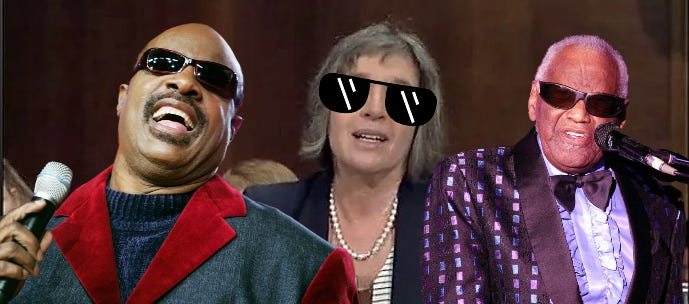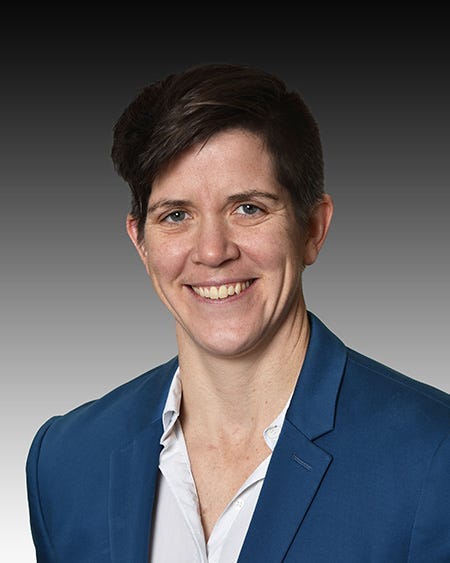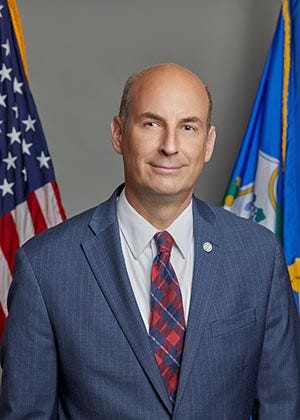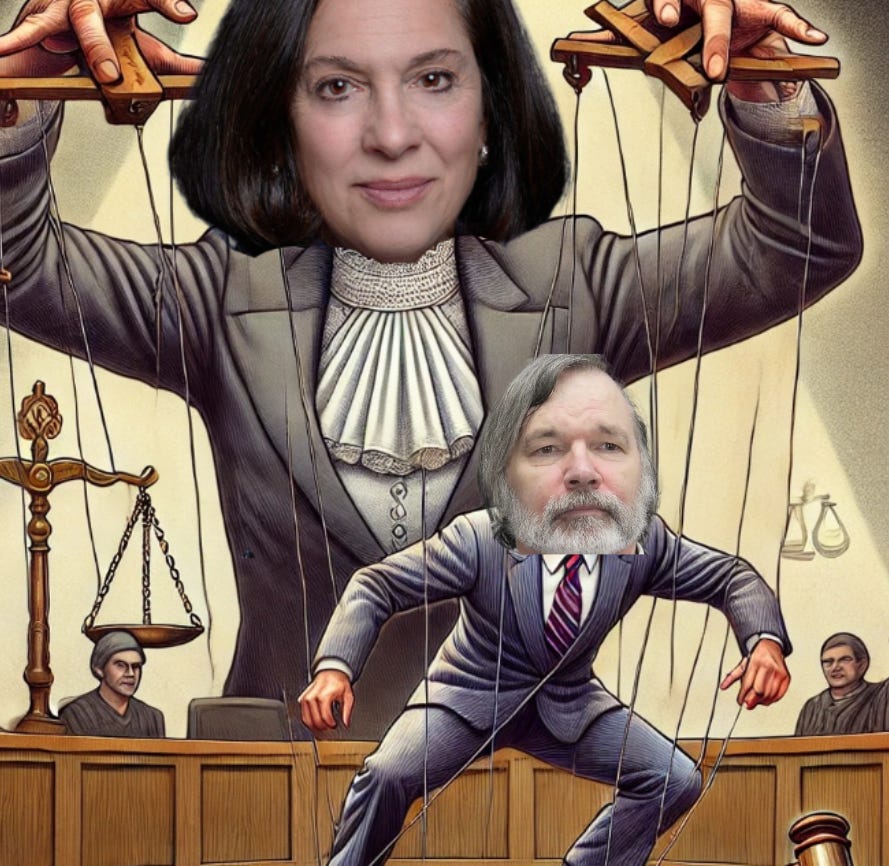By Richard Luthmann
The Hartford Courant’s Ed Mahony has yet again published an article on Paul Boyne’s ongoing case. The article frames the blogger’s 15-month detention and accusations of cyberstalking as a black-and-white issue of alleged harassment rather than examining the constitutional concerns at the heart of Boyne’s story.
Mahony’s latest piece, published under the title “Man accused of harassing CT judges found competent to stand trial, fires lawyers,” presents a heavily slanted narrative. It focuses on state claims that Boyne’s posts are dangerous and minimizes the profound First Amendment issues Boyne says his case raises.
Boyne has used his blog, The Family Court Circus, to criticize Connecticut’s judiciary, especially its family court system. Mahony’s coverage, which emphasizes Boyne’s alleged “malicious blog postings” and frames him as a potential threat, omits the fundamental question at the center of Boyne’s case: whether his speech, however critical or confrontational, is protected under the First Amendment.
In dismissing these questions, Mahony comes across as a mouthpiece for the state—a characterization Boyne openly addressed, calling the Courant coverage an “embarrassment” that failed to challenge state overreach.
As the judiciary continues to push for Boyne’s prosecution, his case will test the boundaries of First Amendment protections and the role of the media in holding powerful institutions accountable.
If Boyne’s warnings are ignored, his case could set a precedent that allows state officials to sideline critics with impunity. This troubling possibility underscores the stakes in the battle over Boyne’s right to speak freely.
Competency Questions: Boyne, Judge Brown, and a Systemic Effort to Stifle Dissent
Judge Peter Brown recently declared Boyne competent to stand trial after Boyne dismissed his attorneys, Jennifer Buyske and Alice Powers, for suggesting that his mental competency was in question. In the competency hearing, Boyne and Judge Brown clashed, with Boyne resisting what he sees as the judge’s and his attorneys' efforts to push a false narrative around his mental state.
“I don’t need people suggesting I’m crazy just because I’m criticizing the Connecticut courts,” Boyne said. “That’s exactly what the state wants—to label me incompetent so they can avoid dealing with the reality of what I’m saying.”
During the competency hearing, Boyne’s refusal to undergo a formal mental health evaluation became a sticking point. According to court records, Judge Brown had ordered an assessment based on recommendations from Boyne’s attorneys, who claimed his insistence that former Connecticut Supreme Court Justice Joette Katz was secretly involved in his case indicated a lack of fitness for trial.
Boyne, however, argued that his concerns are factual, not the product of delusion, and maintained that he has the right to represent himself without being subject to mental health evaluation.
This outlet has published the evidence Boyne believes points to Katz’s involvement. Ed Mahony has seen it, yet the Courant’s reporting does not reference Boyne’s basis for his beliefs that Joette Katz is “out to get him.”
This outlet previously reported:
Joette Katz Part of Boyne Investigation While a Private Citizen
The emails, dated between March 28, 2022, and April 19, 2022, are part of the Brady discovery in Boyne's case. Handwritten on the email is the language: “Cease and desist to stop uploading. Katz Speak To Only.”
The email string appears to show Private Citizen Katz coordinating behind the scenes with Connecticut officials, including Detective Samantha McCord and Assistant State’s Attorney Brian Staines. The note “Katz Speak to Only” written across the email suggests Katz’s involvement in the investigation.
Former Associate Justice Katz stepped down from the Connecticut Supreme Court on January 5, 2011, in anticipation of assuming the post of DCF Commissioner. She was confirmed by unanimous vote of the Connecticut State Senate on February 4, 2011. Commissioner Katz retired from DCF in January 2019.
On Jan. 14, 2019, Katz joined Shipman & Goodwin LLP as a partner in its Business Litigation Practice Group. She continues to practice law there presently.
Between March 28, 2022, and April 19, 2022, Katz was an attorney and private citizen with no governmental connection.
Joette Katz's position on Boyne's blog is well-documented.
In a January 2022 article for the Connecticut Law Tribune, she wrote about a blog—widely understood to be Boyne's—stating that it had escalated from "vile, disgusting anti-Semitic, anti-gay, anti-Black rants to actual threats of violence and death."
Katz further emphasized the dangers of such rhetoric:
"While I know that it's not always easy to draw the line between a true threat and a statement that's simply alarming because of its violent and offensive language, I feel confident in stating that the threats made in the blog cross the line and are dangerous."
At a 2022 Anti-Defamation League symposium, Katz spoke about using legal tools to combat hate speech, even when direct convictions are challenging to secure. Boyne believes that Katz's public advocacy aligns with her alleged private efforts to influence his “silencing” prosecution, thus infringing upon his First Amendment and Due Process rights.
Is Joette Katz Running a Connecticut ‘Inglorious Basterds’ Squad?
The pressing question is, why was former Justice Katz involved in the Boyne investigation as a private citizen?
Also, why hasn’t former Justice Katz been vocal about her activities in this area, as she has been about everything else?
Maybe she is a modern-day “Nazi Hunter” running an “off-book” “Inglorious Basterds” operation in Connecticut? Many wouldn’t blame her.
Others would be concerned about a small thing called the Bill of Rights. What can be sanctioned on foreign soil in times of war (or in Quentin Tarantino’s imagination) may not pass constitutional muster on U.S. soil and when targeted against American citizens.
In a famous case involving anti-Semites, National Socialist Party of America v. Village of Skokie, the U.S. Supreme Court said a person's assertion that speech is being restrained must be reviewed immediately by the judiciary…
What is going on? The public has a right to know, and quickly.
Boyne highlighted the ironic and contradictory logic of his attorneys' and Judge Brown’s approach: “If my criticisms of the judiciary and Joette Katz’s role in this make me ‘incompetent,’ then why am I in front of a judge?” Boyne said. “They’re trying to have it both ways—they want me deemed fit enough to stand trial but crazy enough to dismiss my own defense.”
Dismissal of Attorneys: Jen and Alice, and the Allegations of Ineffective Representation
Boyne’s frustrations with his court-appointed attorneys, Jennifer Buyske and Alice Powers, were also a point of contention. Boyne accuses the two attorneys of disregarding critical issues, including violating his First Amendment rights and protections for journalists under Connecticut law, which prohibits state interference with journalistic materials unless strict criteria are met.
According to Boyne, his attorneys failed to argue that he qualifies as a journalist under this provision, which should protect him from some charges against him.
“Jen and Alice weren’t interested in defending my First Amendment rights,” Boyne said. “They were more interested in appeasing the court and the prosecution. They didn’t mention that Connecticut law protects journalists like me.”
Boyne alleges that Buyske and Powers dismissed his input on strategy, frequently belittling his knowledge of the law and ignoring his objections to the competency narrative.
“They treated me like I was a child or didn’t understand my own case,” he said. “But the fact is, I’ve studied the First Amendment and know the limits of what the state can do. Jen and Alice didn’t want to hear it. They wouldn’t even entertain the idea of arguing for my right to publish critical opinions of the judiciary.”
Prosecutor Jack Doyle and the Strategy to Undermine Free Speech
According to Boyne, the competency hearing and the efforts by his dismissed attorneys were part of a broader strategy led by New Haven State’s Attorney Jack Doyle, who has aggressively pursued the cyberstalking charges against him. Doyle, Boyne argues, is less concerned with public safety and more interested in silencing a critic of Connecticut’s judicial practices.
“Jack Doyle isn’t prosecuting a case—he’s leading a campaign to shut down criticism of the Connecticut judiciary,” Boyne said.
Boyne believes Doyle’s intent to discredit him as a dangerous figure stems from a desire to protect the reputation of the judiciary rather than uphold the law.
“Doyle knows that if my case is framed as a First Amendment issue, he’ll lose,” Boyne asserted. “So instead, he paints me as a threat, someone who has to be controlled and silenced.”
Boyne’s criticism echoes the ruling in Mashaud v. Boone, a D.C. Court of Appeals case, that holds the government cannot suppress speech simply because it may be offensive or unsettling. The court stated, "The government may not prohibit the expression of an idea simply because society finds the idea itself offensive or disagreeable.”
Boyne sees his blog as squarely protected under this precedent and contends that Doyle’s prosecution ignores this principle entirely.
“If Doyle can take me down for blogging criticism, then there’s no protection left for any journalist or citizen who wants to speak out,” Boyne said. “They’re coming after me first because I dared to criticize the most powerful people in the state. But if this is allowed, it will only be the beginning.”
Ed Mahony and the Courant: Failing to Question the System
Boyne has been outspoken in his criticism of Mahony’s reporting for the Hartford Courant, which he believes enables the state’s strategy to marginalize his case as something other than a legitimate First Amendment issue.
In Mahony’s latest article, he writes that Boyne has “not admitted authorship” of The Family Court Circus, a statement that Boyne called a “blatant misrepresentation.” Boyne has repeatedly acknowledged that he is the publisher, insisting that the content of his blog should be recognized as protected speech.
“Why is Mahony pretending I haven’t claimed the blog? I’ve said it countless times,” Boyne emphasized. “They’re not reporting the facts because it doesn’t fit their narrative. Mahony wants people to think I’m hiding something, that I’m not a ‘real journalist,’ so it’s easier to paint me as some crazy guy.”
According to Boyne, Mahony’s refusal to acknowledge him as a journalist aligns with the judiciary’s narrative that he is simply a disgruntled individual, not a legitimate critic deserving of First Amendment protection.
Boyne argued that Mahony’s reporting fails to question the judicial system’s handling of his case, including his sudden transfer to New Haven and the confiscation of his legal materials.
“If Mahony were doing his job, he’d be asking why my legal papers were taken and why I’m being held under conditions that prevent me from preparing my defense,” Boyne said.
The court’s ongoing refusal to treat Boyne as a journalist is another element that Boyne feels Mahony has deliberately sidestepped in his coverage.
“The state doesn’t want people to see me as a journalist because journalists have rights that protect them from this kind of prosecution,” Boyne said. “By framing me as just some guy ranting online, Mahony is helping the state avoid that issue entirely.”
Judicial Accountability and the Role of the Press
As Boyne’s case draws closer to trial, his frustrations with his treatment—and with media outlets like the Hartford Courant—are intensifying. He warns that the erosion of First Amendment protections in his case should be cause for alarm beyond Connecticut.
“When the media just repeats whatever the state says, it’s a serious problem for all of us,” Boyne stated. “If I can be silenced for speaking out, anyone can.”
In addition to criticizing Mahony’s lack of scrutiny, Boyne questioned why Mahony and the Courant have failed to cover his arguments about Connecticut’s laws on stalking and cyberstalking. Boyne points to recent case law and rulings that confirm stalking statutes cannot apply to speech alone, particularly in cases involving political or public-interest commentary.
“There are Connecticut cases that say speech is protected under the stalking statutes, and Mahony hasn’t said a word about it,” Boyne said. “He’s more interested in making me look dangerous than in reporting the law.”
Boyne remains resolute in challenging what he views as judicial overreach. Still, he is clear that the Connecticut media’s reluctance to cover his story impartially has made his fight more difficult.
“The press is supposed to be a check on power, not a servant to it,” he said. “Mahony and the Courant have chosen to be tools.”

























Share this post